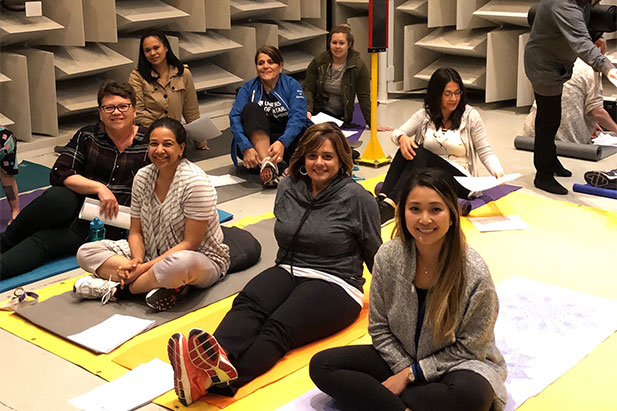University gets loud about mental health
Hosts Mental Health Awareness Week workshops and events to help reduce stigma, increase resiliency
June 5, 2018

Most of us know at least one person who has struggled with mental health challenges at some point in their lives. According to the Mental Health Commission of Canada, one in five Canadians experiences a mental health issue every year. But stigma continues to be a problem: many people living with mental illness fear being judged or discriminated against by friends, family members and co-workers.
In recognition of Mental Health Awareness Week in Canada, the University of Ontario Institute of Technology’s Healthy Workplace Committee hosted a series of workshops and events designed to get people talking about mental health. Led by experts from the university and the community, the workshops aimed to help reduce mental illness stigma and increase resiliency by providing opportunities for the campus community to share information and become more aware of available mental-health resources.
Workshops included:
- Navigating the Mental Health System – Mireille Huneault, Health Promotions Specialist, Canadian Mental Health Association Durham
- Sleep and Mental Health – Efrosini Papaconstantinou, PhD, Assistant Professor, Faculty of Health Sciences (FHS)
- Parenting Resilient Children and Teens - Lindsey Partridge, Public Health Nurse, Region of Durham
- Introduction to Mental Health Training in the Workplace - Jennifer Laffier, PhD, Associate Teaching Professor, Faculty of Education
- Mindfulness and Meditation in ACE’s Hemi-Anechoic Chamber - Wendy Stanyon, PhD, Associate Professor, FHS
- Managing Your Money (webinar bridging the gap between health and finances) - Sara Zollo, Financial Advisor, Sun Life Financial
The university also encouraged everyone in the community to become Mindsight-certified. Dr. Wendy Stanyon developed Mindsight as a free, easy-to-use online educational resource designed to reduce stigma by promoting awareness of mental illness, and facilitating a greater understanding of basic strategies and resources for supporting individuals experiencing a mental health challenge.
Quotes:
“Awareness is a key step in addressing mental health issues. Mental-health workshops at the University of Ontario Institute of Technology help the campus community become more aware of the symptoms of mental health problems so they can recognize it and help themselves, students or co-workers. They also learn how and where to seek help, and to know it’s ok to ask for help.”
- Jennifer Laffier, PhD, Associate Teaching Professor, Faculty of Education, University of Ontario Institute of Technology
“It’s hard being a parent. Mental health workshops help us share the latest information about how parents can help their children self-regulate and become more resilient. Parents can also learn from each other about what approaches work for them.”
- Lindsey Partridge, Public Health Nurse, Region of Durham
“The stigma still exists out there; these workshops teach people that it’s OK to get help, and that they’re not going to be judged or labelled as weak. Accepting that you need help—and having someone at your side to walk through your challenges with you—can turn things around for you.”
- Mireille Huneault, Health Promotions Specialist, Canadian Mental Health Association Durham.



